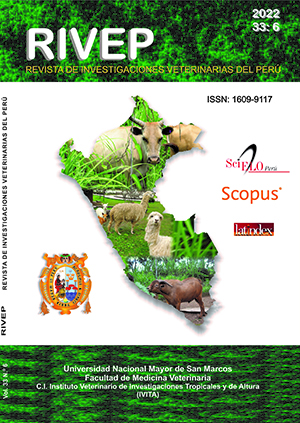Characterization and classification of backyard poultry farming in Boyacá, Colombia, and its effect on food security
DOI:
https://doi.org/10.15381/rivep.v33i6.22753Keywords:
productive system, rural sociology, small-scale poultry farming, family agricultureAbstract
Backyard poultry farming is a traditional productive practice of family farming that contributes to family nutrition, female empowerment and cohesion in the territories. The objectives of this study were to characterize and classify the backyard poultry farming systems (BPS) in the peri-urban area of Tunja (Boyacá-Colombia) and to determine their contribution to the dimensions of food security. Sociocultural, socioeconomic, technical and planning variables were used. The perception of food insecurity of the participants was analyzed using the Latin American and Caribbean Food Security Scale. In total, 138 BPS from 11 municipalities of Boyacá were typified through cluster analysis of mixed data. The BPS were characterized by being in charge of older adult women with low levels of schooling, mainly owning farms of less than 5 ha. The birds are kept with poor management practices, poor infrastructure and poor health care. The BPS can be classified into three categories: 1) BPS-traditional self-consumption (40.5%); 2) BPS-traditional sales and self-consumption (44.2%); and 3) BPS-in transition (13.7%). Backyard poultry farming contributes to the dimensions of food security, since it favors the availability and direct access to foods of high biological value, such as chicken meat and eggs, allowing this type of food to reach remote places, where the quality of life of its inhabitants is low based on the relationship between housing conditions, the size of the properties and access to public services.
Downloads
Downloads
Published
Issue
Section
License
Copyright (c) 2022 Laura Hortúa-López, Mario Cerón-Muñoz, María Zaragoza-Martínez, Joaquín Angulo-Arizala

This work is licensed under a Creative Commons Attribution 4.0 International License.
AUTHORS RETAIN THEIR RIGHTS:
a. Authors retain their trade mark rights and patent, and also on any process or procedure described in the article.
b. Authors retain their right to share, copy, distribute, perform and publicly communicate their article (eg, to place their article in an institutional repository or publish it in a book), with an acknowledgment of its initial publication in the Revista de Investigaciones Veterinarias del Perú (RIVEP).
c. Authors retain theirs right to make a subsequent publication of their work, to use the article or any part thereof (eg a compilation of his papers, lecture notes, thesis, or a book), always indicating the source of publication (the originator of the work, journal, volume, number and date).










